|
|
|
Sort Order |
|
|
|
Items / Page
|
|
|
|
|
|
|
| Srl | Item |
| 1 |
ID:
189224
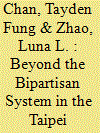

|
|
|
|
|
| Summary/Abstract |
Current literature on political marketing seldom investigates elections in non-Western regions or countries. The analysis of the Taipei mayoral elections (TMEs) can fill this academic vacuum. This article studies the election campaigns for the TMEs between 1994 and 2018 to understand and analyse the political marketing strategies used by candidates and political parties in Taiwan, an East Asian democracy. While the New Party (NP) stuck to a product-oriented strategy, the Kuomintang (KMT) and the Democratic Progressive Party (DPP) employed sales-oriented strategies in most TMEs. This article argues that political parties with strong ideologies find it hard to use the market-oriented electoral strategy. The victory of Ko Wen-je in 2014 and 2018 TMEs can be analysed in terms of the successful employment of a market-oriented strategy. However, given the changing environment of local politics, Ko and his party, the Taiwan People’s Party (TPP), may not follow market-oriented strategies in future TMEs.
|
|
|
|
|
|
|
|
|
|
|
|
|
|
|
|
| 2 |
ID:
089269
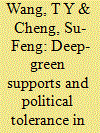

|
|
|
| 3 |
ID:
124845
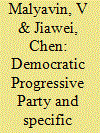

|
|
|
|
|
| Publication |
2013.
|
| Summary/Abstract |
The article examines the evolution of democratic institutions in Taiwan during the period of the rule of the Democratic Progressive Party (2000-2008). It analyzes the consequences of this phenomenon for the country's political life. Special attention is paid to the complex relations between nationalism and democracy in Taiwan.
|
|
|
|
|
|
|
|
|
|
|
|
|
|
|
|
| 4 |
ID:
091039
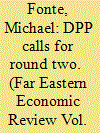

|
|
|
|
|
| Publication |
2009.
|
| Summary/Abstract |
The Democratic ProgressiveParty is rebuilding its support among Taiwan's voters after severe defeats in Taiwan's 2008 Legislative Yuan and presidential elections. The process began earlier this year with grassroots efforts such as rallies, a referendum drive, volunteerism and typhoon relief. The party is now developing new policies to attract independent, middle-class and working-class people hit hardest by the economic recession. The first results emerged on Sept. 26, when voters elected the DPP's Liu Chien-kuo to the Legislative Yuan from Yunlin County and defeated a Kuomintang-backed referendum on casinos in Penghu County.
|
|
|
|
|
|
|
|
|
|
|
|
|
|
|
|
| 5 |
ID:
121836
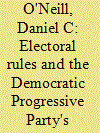

|
|
|
|
|
| Publication |
2013.
|
| Summary/Abstract |
The Democratic Progressive Party (DPP) in Taiwan increased its vote share in each legislative election from 2001 to 2008. Nevertheless, the 2004 and 2008 elections were widely viewed as major defeats for the party. Through an analysis of the DPP's performance in these elections, this article considers the effects of electoral rules on election outcomes and the perception of those outcomes. In Taiwan, under both the previous single non-transferable vote (SNTV) and the current mixed member majoritarian (MMM) systems, the mechanical effect of how electoral rules translate votes into seats and the psychological impact this has on voter and party behavior have influenced party electoral performance, and the perception of it, by causing vote and seat shares to diverge. In addition, this article analyzes whether recent redistricting in Taiwan structurally disadvantages the DPP.
|
|
|
|
|
|
|
|
|
|
|
|
|
|
|
|
| 6 |
ID:
100658


|
|
|
| 7 |
ID:
130629
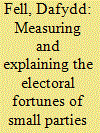

|
|
|
|
|
| Publication |
2014.
|
| Summary/Abstract |
Over the last two and half decades the Kuomintang and Democratic Progressive party have dominated Taiwan's party system. From 2008-2012 they were the only parties represented in the Legislative Yuan. Nevertheless, there have been periods in which other parties have had a significant impact on the party system. These parties have received considerable media attention during and between campaigns, won significant members of parliamentary and local assembly seats, and affected the Taiwanese political agenda. In this paper I assess the impact of these small parties on the party system and offer some explanations for their electoral successes and failure over the last decade.
|
|
|
|
|
|
|
|
|
|
|
|
|
|
|
|
| 8 |
ID:
091836
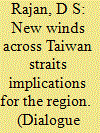

|
|
|
|
|
| Publication |
2009.
|
| Summary/Abstract |
Two extraordinary events have taken place in the recent period, symbolising the fast growing in relations between Beijing and Taipei- Taiwan's participation (Geneva, 18-27 May 2009) as an observer under the name Chinese Taipei in the World Health Assembly, the executive arm of the World Health Organization (WHO), with firm blessings from Beijing and the Chinese Communist Party (CCP) chief Hu Jintao's congratulatory telegram (27 July 2009) to the newly elected head of Taiwan's ruling Kuomintang (KMT) Ma Ying-Jeou.
|
|
|
|
|
|
|
|
|
|
|
|
|
|
|
|
| 9 |
ID:
100998
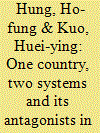

|
|
|
|
|
| Publication |
2010.
|
| Summary/Abstract |
In turning the vast and diverse territory of the Qing Empire into a singular nation-state, Beijing has kept redefining its conception and institution of nationhood in response to challenges from the recalcitrant or not-yet-incorporated peripheral regions including Tibet, Hong Kong, and Taiwan. Since 1949, Beijing has attempted to solve the Tibet and Taiwan questions with the institutional design of "one country, two systems." This design, widely thought of as a 1980s invention, can in fact be dated back to the early 1950s with respect to Tibet. This design has been far from successful in Tibet and Taiwan. While the "one country, two systems" experiment in Tibet failed with the Lhasa uprising and the flight of the Dalai Lama in 1959, the proposal of "one country, two systems" lost its appeal and had become a taboo among politicians of all strips in Taiwan by the 21st century. In this article, we argue that the success of "one country, two systems" requires a very delicate balance and virtuous interaction between the political center in Beijing and the elite, as well as popular classes, in the periphery concerned. It can easily be jeopardized if the center tilts too much to the left or right.
|
|
|
|
|
|
|
|
|
|
|
|
|
|
|
|
| 10 |
ID:
077033
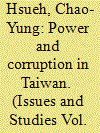

|
|
|
| 11 |
ID:
092511
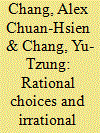

|
|
|
| 12 |
ID:
076674
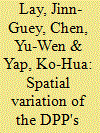

|
|
|
| 13 |
ID:
094476
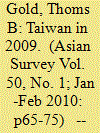

|
|
|
| 14 |
ID:
103630
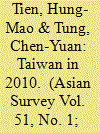

|
|
|
|
|
| Publication |
2011.
|
| Summary/Abstract |
The November 2010 urban mayoral elections in Taiwan will set the stage for national elections in 2012 between the Nationalist Party and the rising Democratic Progressive Party. Meanwhile, Taiwan and China successfully concluded the Economic Cooperation Framework Agreement in summer 2010, deepening economic ties across the Taiwan Strait.
|
|
|
|
|
|
|
|
|
|
|
|
|
|
|
|
| 15 |
ID:
113909
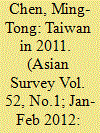

|
|
|
|
|
| Publication |
2012.
|
| Summary/Abstract |
Developments in Taiwan's politics, economy, society, and external relations in 2011 were closely tied to the presidential election contest. In the months leading up to the election, incumbent President Ma Ying-jeou held a slight lead in the polls over DPP Chairwoman Tsai Ing-wen. James Soong's late entry into the race had little impact on the outcome, and Ma Ying-jeou was reelected.
|
|
|
|
|
|
|
|
|
|
|
|
|
|
|
|
| 16 |
ID:
146896
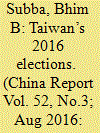

|
|
|
|
|
| Summary/Abstract |
This article examines the recent Presidential and Legislative Yuan (LY, 立法院) elections in Taiwan. The Democratic Progressive Party (DPP) swept elections at both levels. Its candidate was elected as the island’s first female president. On the other hand, the ruling Kuomintang (KMT) lost its majority in the legislature for the first time since competitive electoral democracy began in Taiwan. These elections saw a change in the agenda of the major parties, especially that of the DPP, on various domestic and external issues. At the same time, the growth of student and civil society movements and their participation in the political arena since the 2014 Sunflower movement have carved out a niche in Taiwanese politics today. This article offers some preliminary comments on the significance and impact of the elections on Taiwan’s changing domestic and political landscape, with the emergence of new political forces and socio-economic challenges, along with nebulous Cross–Strait relations and ‘shrinking’ international space and diplomacy. How TsaiIng-wen’s administration after 20 May will deal with these intricate issues will be a test for her presidency.
|
|
|
|
|
|
|
|
|
|
|
|
|
|
|
|
| 17 |
ID:
083256
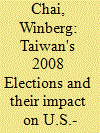

|
|
|
|
|
| Publication |
2008.
|
| Summary/Abstract |
Outgoing Taiwanese President Chen Shui-bian's Democratic Progressive Party (DPP) was defeated in the historic 2008 presidential and legislative elections, and voters returned the reins of government to the long-ruling Nationalist Party (KMT). The author analyzes the KMT's return to power after eight years of DPP rule, its significance, and its potential to create new stability in East Asia and better cooperation between the United States and Taiwan. The author also examines the reasons for the DPP's resounding defeat, including its traditional oppositional role in Taiwanese politics and its failure to deliver on its promises to reduce corruption and maintain economic well-being. The author further analyzes the DPP policies' disastrous impact on Taiwan's domestic scene and its regional alliances. The author concludes with a prediction of what the KMT's return will mean for U.S.-China-Taiwanese relations.
|
|
|
|
|
|
|
|
|
|
|
|
|
|
|
|
| 18 |
ID:
100582
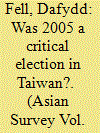

|
|
|
|
|
| Publication |
2010.
|
| Summary/Abstract |
This study applies the concept of critical elections to Taiwan's recent political history. Instead of 2008, it is argued that 2005 deserves the title of a critical election. Political developments in 2005 laid the foundations for the Kuomintang's return to political dominance.
|
|
|
|
|
|
|
|
|
|
|
|
|
|
|
|
| 19 |
ID:
176132
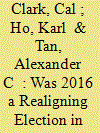

|
|
|
|
|
| Summary/Abstract |
The January 2016 presidential and legislative elections in Taiwan produced a dramatic and unprecedented victory for the Democratic Progressive Party over its long-time rival, the Kuomintang. The party had never had a parliamentary majority before 2016. The elections indicated the potential for fundamental change in Taiwan’s party system. This is what political scientists call a critical realigning election. The problem with identifying these elections, such as the 1896 and 1932 ones in the United States, is that we can only be sure of such an interpretation after a significant amount of time has passed. Still, some of the changes in Taiwan are fundamental enough to make such an evaluation worthwhile. We summarize realigning elections; discuss the factors that may lead to a change in the partisan balance; and describe the growing role of protest parties and social movements in Taiwan politics.
|
|
|
|
|
|
|
|
|
|
|
|
|
|
|
|
|
|
|
|
|